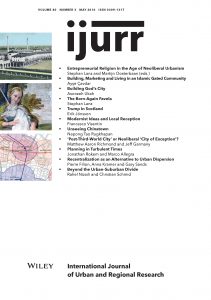Growing dissatisfaction with the prevailing dispersed urban form and its generalized reliance on the automobile has resulted in the formulation of planning models seeking to substitute dispersed development with recentralization. A survey of 301 planning documents with a metropolitan focus, originating from the 58 US and Canadian urban regions with a population exceeding one million, reveals widespread support for urban recentralization. But interviews with 55 planners, involved in the preparation of these plans and/or the implementation of their proposals, highlight actual and foreseen barriers to the implementation of recentralization strategies. The article interprets the popularity of recentralization in planning documents as the outcome of planners’ attempts to reconcile their commitment to sustainable development with societal factors affecting planning possibilities. Still, we anticipate serious problems in achieving large-scale recentralization due to urban development path dependencies emanating from the prevailing urban form and dynamics, institutional structures, and from the limited urban transformative potential afforded by neoliberalism.
Details
Written by:
Pierre Filion, Anna Kramer, Gary Sands
Digital Object Identifier (DOI)
10.1111/1468-2427.12374
About DOI

